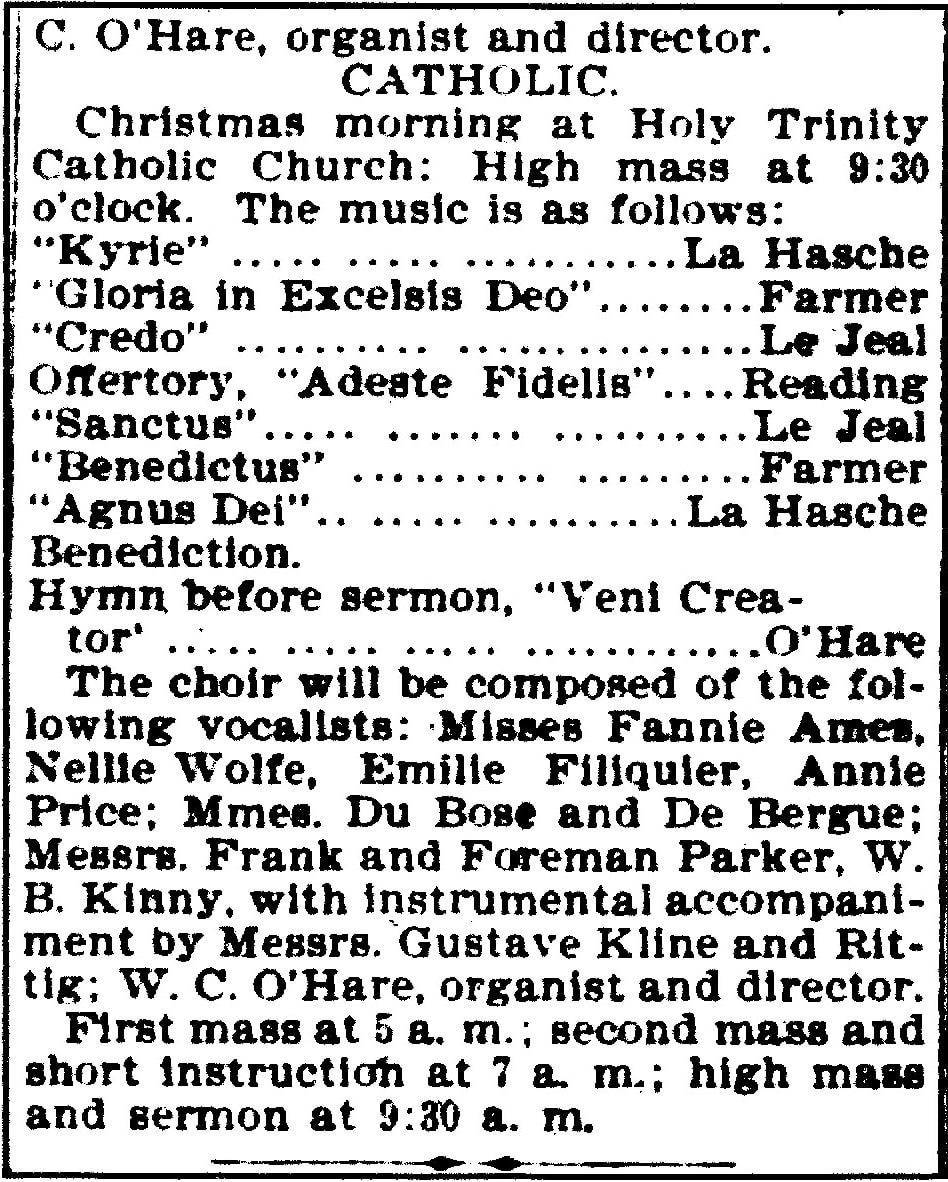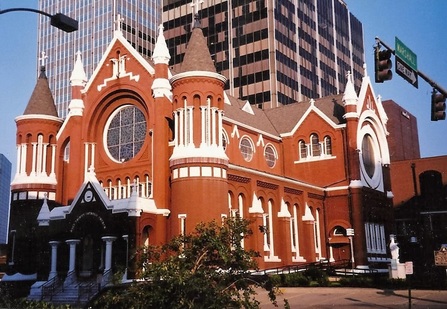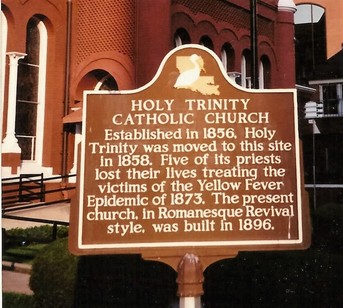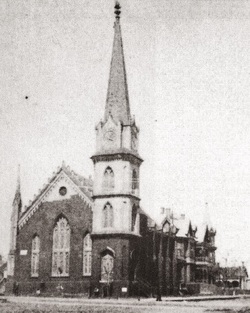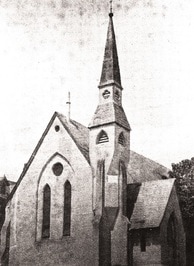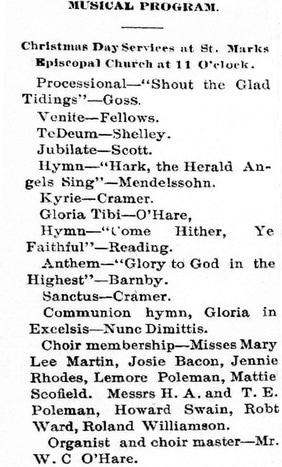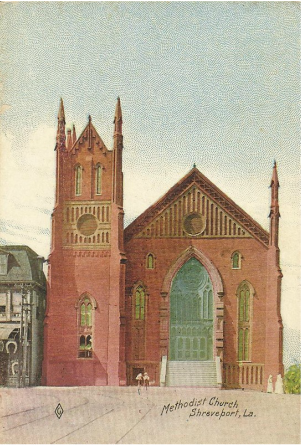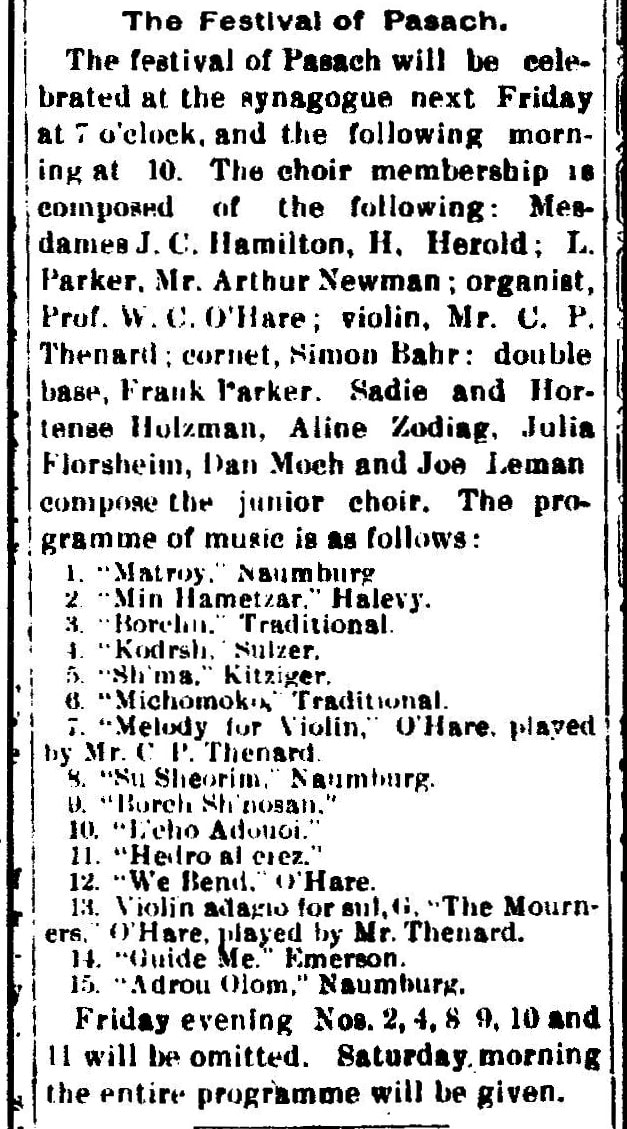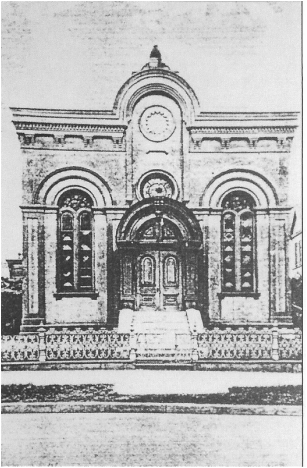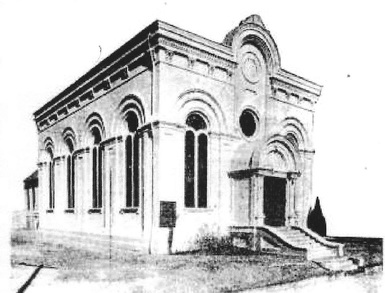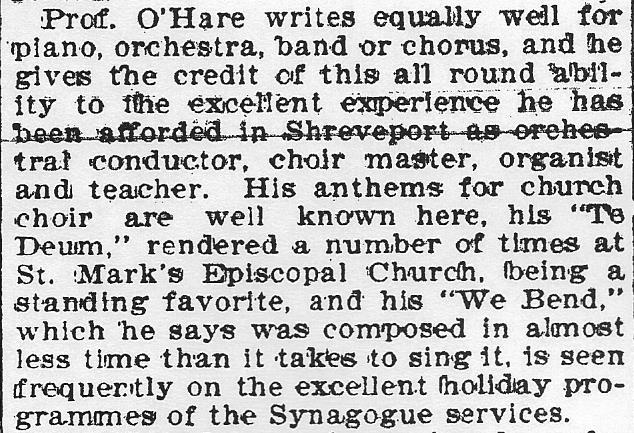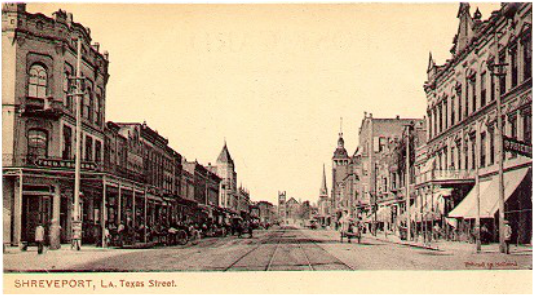Throughout his Shreveport years, William Christopher O'Hare also brought music into several Shreveport churches, serving as organist and choir director for regular services, special programs, and weddings, and sometimes composing music used during the services.
Holy Trinity Catholic Church
As Catholics, the O'Hare's attended Holy Trinity. The items below document a few of O'Hare's activities at Holy Trinity and also mention several people who must have been more than casual acquaintances--Sturtevant, Ames, and Dubos, names to be seen again in connection with O'Hare's marriage and his sons' baptisms at which Father Gentille officiated.
Mr. L. Vandegear, of Many, La., deliberately came into our midst and took unto his heart and home Miss Emma Currie, taking her dearest friends by surprise. High nuptial mass was celebrated by Father Gentille, at the Holy Trinity church, on Wednesday morning at 10 o'clock, in the presence of friends and relatives. As Prof. O'Hare brought out the thrilling notes of the organ in the wedding march, the bride, arrayed in white, with a veil like a misty cloud enveloping her graceful figure, leaning confidently on the arm of her chosen husband, marched up the aisle followed by the selected attendants. --Sept. 1889
The members of the Catholic church choir have prepared some fine music for Easter Sunday. The service Easter Sunday begins at 9:30 a.m. and the programme in the choir is as follows: Kyrie, Mozart; Gloria and Credo, Lejeal; Regina Coeli, Werner; . . . Agnus Dei, O'Hare. The choir consists of Mesdames Hoche, Currie, Parker, and DuBos; Misses Ames and Nolan; Messrs. Parker and Sturtevant. Orchestra--Messrs. C. P. Thomas, N. S. Allen, Kline, Bristol, Simon Levy, Warring, Leaton, and Riccou; organist and director, Professor Wm. C. O'Hare. --Mar. 1890
There will be high mass at Holy Trinity church today at 9:30. It is a feast day--Trinity Sunday, and Mrs. Parker, Mrs. Dubos, Mrs. Hock, Misses Ames and Nolan, Messrs. Parker, Sturtevant and Professor O'Hare will compose the choir. --June 1890
|
|
An Amusing Anecdote from Father Gentille's Diary
Little did O'Hare know what he was walking into when he assumed the position of organist and choir director at Holy Trinity.
For more than a decade before his arrival in Shreveport, a long-standing feud had existed between Father Gentille and the Holy Trinity organist and choir. Shortly after Father Gentille arrived to replace Holy Trinity's first priest, who had died in the 1873 yellow fever epidemic, the trouble began. A July 27, 2000 email from the Diocese of Shreveport's archivist tells this backstory:
For more than a decade before his arrival in Shreveport, a long-standing feud had existed between Father Gentille and the Holy Trinity organist and choir. Shortly after Father Gentille arrived to replace Holy Trinity's first priest, who had died in the 1873 yellow fever epidemic, the trouble began. A July 27, 2000 email from the Diocese of Shreveport's archivist tells this backstory:
The choir organization headed by the organist at the time, a Mr. Doll, attempted to purchase a new organ without the pastor's approval for what appeared to be an enormous price of $200. The pastor refused to pay, and the organ was removed from the loft of the church and placed on the street for the salesman to pick up.
After reiterating that the organ incident was only the beginning of Father Gentille's problems centering on Holy Trinity's music personnel, the archivist quotes an entry from Father Gentille's diary:
1894--During the 1st part of this year there has been some more unpleasantness. It seems that [name of female parishioner] was induced by another lady good and true to the priest to make a collection among Catholics to pay Prof. W. O'Hare the sum of $15.00 per month. The Rev. Father authorized them to do it. They went through the congregation, collected how much? God knows. Not satisfied with their collection, they went around and announced an "Ice Cream festival" the very week that Father was trying to collect money for building a house for a Sexton on the Catholic Cemetery. Both undertakings could not succeed. Father's collection failed. They said they collected some $60.00. The Professor was entitled to no more than $15.00. What use has been made of the $45.00?
While the women had earned enough to pay Holy Trinity's organist and choir director four months' wages, their priest felt these actions worthy of a written warning to his successor about one "meddlesome" woman within the church "implicated in all his troubles." Because her descendants remained Holy Trinity parishioners, the name of Father Gentille's nemesis has been omitted at the archivist's request.
First Baptist Church
O'Hare also served as organist and choir director at downtown Shreveport's Baptist church where some of his choir members' names are familiar from Holy Trinity's choir. Like O'Hare's youngest sister Nellie in Washington, D.C., several of Shreveport's best singers floated from church to church.
From the newspaper items below, we can conclude that O'Hare temporarily abandoned the Baptist organ sometime after 1890 and returned by February 1892 and then again left after 1895 and returned by January 1900.
From the newspaper items below, we can conclude that O'Hare temporarily abandoned the Baptist organ sometime after 1890 and returned by February 1892 and then again left after 1895 and returned by January 1900.
|
Following the death of former Confederate President Jefferson Davis, First Baptist Church held a special service during which O'Hare's performance stirred audience emotions:
In the evening . . . a service was held at the Baptist church, beginning with the dead march, played by Professor O'Hare on the grand pipe organ, in which the sounds of the bugle and drum could be distinctly heard, as if in the distance, and then the tramping of soldiers, so clear, so real did it all seem, that for a few moments there was a dead silence throughout the church, and we knew from the tears that fell that memories of the battlefield had been recalled. -- Dec. 1889 |
Baptist church, Easter Sunday, 11:00 a.m. Programme: Gloria Patria, O'Hare; Gloria in Excelsis, Mozart; contralto solo Calvary, Rodney, by Mrs. Parker, and appropriate congregational hymns. Evening at 7:30: Gloria Patria, O'Hare; Hallelujah, Fambillotta; soprano solo Come Thy Fount, Willard, by Miss Fanny Clay. The choir will be under the direction of Prof. Wm. C. O'Hare, organist. --1890
Professor W. C. O'Hare has set 'The Lord's Prayer' to an original composition of his, which will be rendered today . . . at the First Baptist church. --1890
Prof. W. C. O'Hare is again presiding over the pipe organ at the Baptist church, which he handles to perfection. --1892
The Baptist choir will be led by Misses Fannie Clay, Lena Hargrove, and Mrs. Warring, sopranos; Mrs. Parker, alto; Messrs. Thrumond and Parker, tenors; Mr. W. W. Warring, bass; Prof. W. C. O'Hare, organist. --1895
Prof. O'Hare now has charge of the Baptist organ, and the choir, with his excellent accompaniments and directorship, feel inspired to sing as they have never sung before. --late January 1900
The revival services opened last night with lively singing by Prof. O'Hare's big chorus choir. "There'll be no dark valley when Jesus comes," "A great day coming," and other gospel hymns were sung by the big audience, led by the choir. --Apr. 1900
St. Mark's Episcopal Church
By 1893, O'Hare had begun presiding at the Episcopal church organ.
Dr. Dalzell, after several weeks' absence at Sewanee, Tenn, preached to a large congregation at St. Mark's church last Sunday. The choir was composed of the following persons: Miss Maude Bacon, soprano; Mrs. Parker, alto; Mr. Walter Marburg, tenor; Mr. Frank Parker, bass; Prof. O'Hare, organist. The choir gave excellent music, and the duets by Miss Bacon and Mrs. Parker were melodiously sweet. --1893 |
At 8 o'clock in the morning of the 1st, guests began to assemble at St. Mark's Episcopal church to witness the ceremony that united two of the city's most popular young people. The little church on the corner was decorated with white roses and delicate ferns, and scented with the fragrance of magnolia blossoms. . . . [The ushers] preceded the bridal party in the march to the altar, while the notes of the wedding march were merrily sounded from the pipe organ presided over by Prof. O'Hare. --1899 Six months later as 1899 drew to a close, O'Hare resigned from St. Mark's, perhaps because he was returning to First Baptist:
Prof. O'Hare , who has presided for the last six or seven years with conspicuous ability at the organ of the Episcopal church, recently resigned as organist. His resignation was accepted by Rev. Mr. Spearing with expressions of appreciation of his long and valuable service. |
First Methodist Church
By 1894, O'Hare began appearing at First Methodist:
St. Valentine's day was most beautifully celebrated at the First Methodist Church, it being the appropriate time to consummate the happy ending made by sly Cupid's darts. The marriage of Miss Caro Wise, the only loved daughter of Colonel and Mrs. W. H. Wise, and Mr. William M. Sloan, of St. Louis, drew a large congregation to the above mentioned edifice. . . . There were in front of the grand old pipe organ rich geraniums, rose camellias and fragrant hyacinths of pure while. . . . . Prof. W. C. O'Hare, seeing the bridal party enter in the mirror on the pipe organ, began the wedding march, which was full of sweet melody. --1894
The I.O.O.F. celebration at the Methodist Church on Friday evening attracted a large number of citizens. . . . The music was excellent as well as the recitations, and the following program carried out: The social element of Shreveport was well represented at the marriage on Wednesday evening, when, despite the cold and disagreeable weather, the First Methodist Church was filled to overflowing to witness the ceremony that united two of the most popular young people in this city . . . Prof. W. C. O'Hare kept the congregation entertained with an organ recital until the bride entered, when the choir sang in chorus the favorite wedding march. --1899 |
B'nai Zion Temple
O'Hare also served as organist at B'Nai Zion, the downtown Reformed synagogue during the majority of his Shreveport years and provided musical leadership for an event raising funds for a new synagogue organ.
Professor W. C. O'Hare has been chosen organist for the Synagogue choir. -- Feb. 1890
The Jewish New Year will be ushered in this evening by imposing services. In addition to the regular choir, a quartette of other instruments has been added to discourse the elaborate musical programme . . . with professor William O'Hare as organist. --Sept. 1890
The synagogue may justly be proud of a new evening service, an original composition of Prof. Wm. C. O'Hare, their organist. This music had received the full approval of Dr. Saenger, the pastor, and is being rehearsed for next Sunday evening's service, which will be at 7:00. The suite abounds in attractive melodies, and rich harmonies, and the few who have already heard it are very enthusiastic in its praise. --Oct. 1890
The synagogue was thronged on Thursday. The music arranged by Prof. W. C. O'Hare was specially selected for the occasion and beautifully and perfectly rendered by a chosen choir.. . . The services of the new year of Israel were most impressive. --Sept. 1892
No entertainment could have been more enjoyable than the open-air promenade concert given at Mrs. Ben Holzman's by the Jewish ladies, for the purpose of increasing the organ fund. The night was all that could be desired for such a diversion. The pale young moon and stars above, the bright electric lights of the customhouse tower, together with the variegated colors of the Japanese lanterns, and the bright lights that shown from the home windows, made a grand illumination for the lawn, which was enclosed and decorated to imitate a roof garden. A canopied pavilion, with drooping curtains overhead, plants and flowers, was erected for the musicians and singers. . . . The vocal music was excellently rendered. Prof. O'Hare was accompanist for the choruses and led the orchestral music which Mr. Leon Kahn accompanied on the piano. --1895
A Rosh Hashana program from B'nai Zion includes O'Hare's We Bend. --Sept. 1897
The Passover devotional services at the Jewish synagogue on Sunday were largely attended and extremely entertaining and impressive. Wm.Christopher O'Hare presided at the organ and the song service was most beautifully rendered. --Mar. 1899
Prof. W. C. O'Hare gave excellent service as organist at the Synagogue yesterday. The choir was composed of the best vocal talent in the city. --Sept. 1899
A Scholar's Theory about We Bend
"We Bend is likely O'Hare's simple translation of the standard prayer in the Amidah----va-anachnu kor'im (and we bow and bend and kneel before God in thankfulness that we are not like the others. Very strong religious statement, even more forcefully intoned during the High Holy Days services." --email comments from the late Irene Heskes, Jewish music scholar
An 1898 Shreveport Times article comments on a portion of O'Hare's sacred music, including We Bend:
View of Texas Street with Churches
|
Showing First Methodist at the far end of street on cross street Common and First Baptist steeple on Texas shortly before and to the right of First Methodist.
All houses of worship where O'Hare played organ and served as choir master were within easy walking distance of each other, and city directories indicate varied service times. O'Hare and some choir members who performed at more than one church could have moved from place to place. |
Background image, top of page: colorized view of Texas Street with churches
